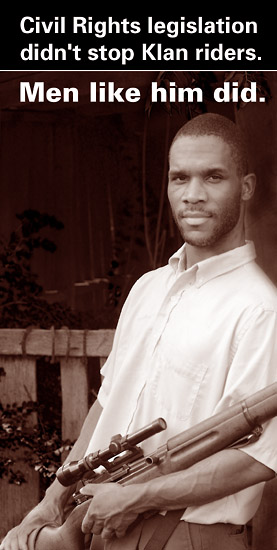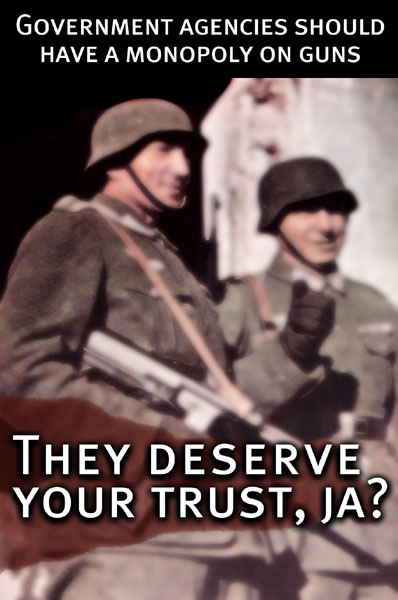Funny how a thread like this goes on indefinitely without anyone actually addressing the topic because they are clouded by their own mypoic views. The topis was The Right to KEEP and BARE ARMS. What did the Fore Fathers Mean? Well, the fore father's aren't here to ask, but we can certainly make some insight into that question from some of the comments they said/wrote:
"What country can preserve its liberties if its rulers are not warned from time to time that their people preserve the spirit of resistance? Let them take arms."
-- Thomas Jefferson to William Stephens Smith, 1787. ME 6:373, Papers 12:356
"What, Sir, is the use of a militia? It is to prevent the establishment of a standing army, the bane of liberty .... Whenever Governments mean to invade the rights and liberties of the people, they always attempt to destroy the militia, in order to raise an army upon their ruins."
-- Rep. Elbridge Gerry of Massachusetts, spoken during floor debate over the Second Amendment, I Annals of Congress at 750, August 17, 1789
"Who are the militia? Are they not ourselves? Is it feared, then, that we shall turn our arms each man against his own bosom. Congress have no power to disarm the militia. Their swords, and every other terrible implement of the soldier, are the birthright of an American...[T]he unlimited power of the sword is not in the hands of either the federal or state governments, but, where I trust in God it will ever remain, in the hands of the people."
--Tenche Coxe, The Pennsylvania Gazette, Feb. 20, 1788
"The best we can hope for concerning the people at large is that they be properly armed."
-- Alexander Hamilton, The Federalist Papers at 184-188
If the representatives of the people betray their constituents, there is then no recourse left but in the exertion of that original right of self-defense which is paramount to all positive forms of government, and which against the usurpations of the national rulers may be exerted with infinitely better prospect of success than against those of the rulers of an individual State. In a single State, if the persons entrusted with supreme power become usurpers, the different parcels, subdivisions, or districts of which it consists, having no distinct government in each, can take no regular measures for defense. The citizens must rush tumultuously to arms, without concert, without system, without resource; except in their courage and despair.
-- Alexander Hamilton, Federalist No. 28
"That the said Constitution shall never be construed to authorize Congress to infringe the just liberty of the press or the rights of conscience; or to prevent the people of the United States who are peaceable citizens from keeping their own arms ... "
-- Samuel Adams, Debates and Proceedings in the Convention of the Commonwealth of Massachusetts, at 86-87 (Pierce & Hale, eds., Boston, 1850)
"What country can preserve its liberties if its rulers are not warned from time to time that their people preserve the spirit of resistance? Let them take arms."
-- Thomas Jefferson to William Stephens Smith, 1787. ME 6:373, Papers 12:356
"What, Sir, is the use of a militia? It is to prevent the establishment of a standing army, the bane of liberty .... Whenever Governments mean to invade the rights and liberties of the people, they always attempt to destroy the militia, in order to raise an army upon their ruins."
-- Rep. Elbridge Gerry of Massachusetts, spoken during floor debate over the Second Amendment, I Annals of Congress at 750, August 17, 1789
"Who are the militia? Are they not ourselves? Is it feared, then, that we shall turn our arms each man against his own bosom. Congress have no power to disarm the militia. Their swords, and every other terrible implement of the soldier, are the birthright of an American...[T]he unlimited power of the sword is not in the hands of either the federal or state governments, but, where I trust in God it will ever remain, in the hands of the people."
--Tenche Coxe, The Pennsylvania Gazette, Feb. 20, 1788
"The best we can hope for concerning the people at large is that they be properly armed."
-- Alexander Hamilton, The Federalist Papers at 184-188
If the representatives of the people betray their constituents, there is then no recourse left but in the exertion of that original right of self-defense which is paramount to all positive forms of government, and which against the usurpations of the national rulers may be exerted with infinitely better prospect of success than against those of the rulers of an individual State. In a single State, if the persons entrusted with supreme power become usurpers, the different parcels, subdivisions, or districts of which it consists, having no distinct government in each, can take no regular measures for defense. The citizens must rush tumultuously to arms, without concert, without system, without resource; except in their courage and despair.
-- Alexander Hamilton, Federalist No. 28
"That the said Constitution shall never be construed to authorize Congress to infringe the just liberty of the press or the rights of conscience; or to prevent the people of the United States who are peaceable citizens from keeping their own arms ... "
-- Samuel Adams, Debates and Proceedings in the Convention of the Commonwealth of Massachusetts, at 86-87 (Pierce & Hale, eds., Boston, 1850)









